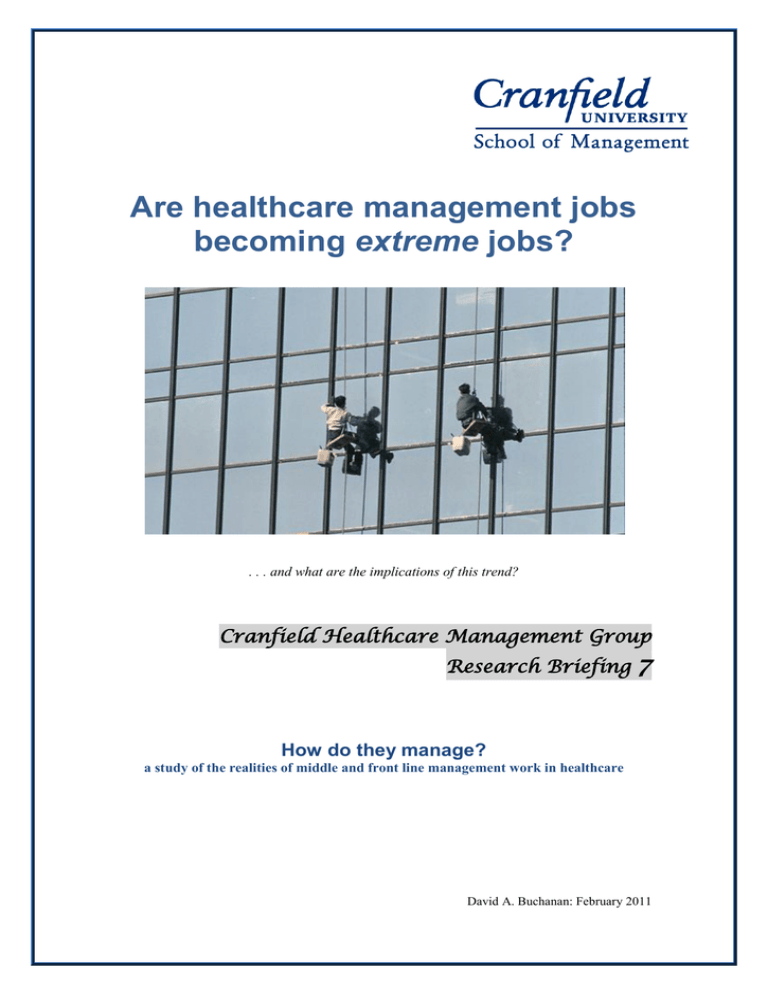Are healthcare management jobs extreme 7 Cranfield Healthcare Management Group
advertisement

Are healthcare management jobs becoming extreme jobs? . . . and what are the implications of this trend? Cranfield Healthcare Management Group Research Briefing 7 How do they manage? a study of the realities of middle and front line management work in healthcare David A. Buchanan: February 2011 Is your job extreme? If you have a management role in an acute hospital, and/or if your clinical or medical role is combined with management responsibilities, then take this simple test. Just indicate ‘yes that’s me’, or ‘no that’s not me’, for each of these statements: 1. I never know what’s going to happen next in this job. 2. I’m always fire fighting, always trying to meet another deadline. 3. My management responsibilities just seem to keep expanding. 4. People seem to expect me to be always available, and to respond to them instantly. 5. I mentor, train, and act as a role model for less experienced staff. 6. I regularly arrive early and leave late - 10 to 12 hour days are normal for me. 7. I make decisions that directly affect the lives of patients. 8. My priorities change every week. 9. I am expected to improve the service we provide, but resources are being cut. 10. I spend a lot of time responding to requests for information, reports, and action plans. 11. I have to get large numbers of people to agree even to make small changes. 12. It doesn’t matter what I do, it’s never good enough. If you said ‘yes’ to six or more of these statements, then you may have an extreme job. This can be exhilarating. But it can also be exhausting. The concept of the extreme job was identified by Sylvia Ann Hewlett and Carolyn Buck Luce in 2006. They define an extreme job as one that involves a working week of 60 hours or more, with an unpredictable and intense pace of work, inordinate scope of responsibility, and other pressures. They found that many people with extreme jobs were attracted by the challenge, enjoyed their work, and felt fulfilled by it. When asked, ‘why do you do it?’, many replied: the adrenaline rush power and status great colleagues good pay recognition for achievement The fact that such jobs can be attractive, paradoxically, could be a problem. The original research found extreme jobs among high-earning professionals in multinational companies, and in management consultancy, law, and finance. Our study suggests that first line, middle, and top managers in acute healthcare may also have extreme jobs. Many hospital managers are ‘hybrids’, combining managerial with clinical responsibilities. If the management component of their roles has become more extreme, this may affect the time and energy that hybrids can devote to patients, and may discourage clinical staff from taking on these extreme jobs in the first place. Working constantly at top speed may not be sustainable. 2 The extreme healthcare model Hewlett and Luce identified ten dimensions of extreme jobs, but four are less relevant in healthcare: direct reports, entertaining clients out of hours, profit and loss responsibility, international travel. The six dimensions that do seem to apply are unpredictable work patterns, fast pace with tight deadlines, broad scope of responsibility, ‘24/7 availability’, mentoring and coaching, and long working hours. (These are the first six test items.) Our study suggests a further six ‘extreme’ healthcare management job dimensions. Here they are, illustrated with (anonymous) quotes from managers who have contributed to this study: making life or death decisions We were on the unit while the alarms were going off, and the patient kept going into cardiac arrest. It was disturbing from my perspective, because I’m a nurse by background and I’ve worked in ITU, and they were flying around, the arrest button was going, alarms were going and it was very hard. dealing with conflicting and changing priorities It’s a case of, ‘what are we going to panic about this week?’ We have more to deal with. There are so many competing priorities and edicts, it’s easy to get swamped and forget why you’re here. There will be a big push on something, because we’re having a visit, or we’re non-compliant in an area, so we do that, then forget it, and move on. We’re having a visit about safeguarding, so that’s in vogue. doing more with fewer resources I was told to ‘get that racking off the floor’, by screwing it to the wall. But I can’t do that; it costs too much. I can’t spend £400 on a bit of equipment, an ophthalmoscope, but we could be sued if a symptom is missed. Medical engineering want £35 a year for the maintenance contract. So, no new equipment. We’re facing greater demands. ‘It’s hamsters on the wheel’. We need head space to look ahead. It’s like Winnie-The-Pooh being dragged backwards down the stairs by Christopher Robin; there must be a better way to come down stairs, if only I could stop bumping and think about it. responding to audit, compliance, regulation and inspection agencies Responding to regulatory bodies, all coming at it from different angles. I spent last week just filling in forms, responding to request for information. I had no time to do anything that would make a difference. I’ve been inspected by the SHA, OFSTED, LINKS (Local Involvement NetworKs), CQC, HOSC (Health Overview and Scrutiny Committee), HSE. They have different requirements, which overlap, but they have different parameters. They all want information, reports, and action plans, which contradict each other. ‘big tent problem solving’; the need to get many people to agree I think I’m creative at finding innovative solutions. But implementing anything new takes massive amounts of energy, and you are ground down. You get doors closed in your face repeatedly. There’s so much red tape. Our hands are tied. I have to get four sign-offs before I can recruit a nurse. We’re not trusted to manage. the floggings will stop when morale improves There are no meetings where you are given credit for success. It doesn’t matter what we do, it’s never good enough. We’re threatened weekly with performance management. When things go wrong, it always comes back to me. The experience of middle and front line managers is, we only get beaten up. My general manager is like ‘the grim reaper’. No positives, all negatives. We never get any thanks or positives, even when we have made our targets. A varied, intense, fast-paced role with responsibility and long hours can be rewarding. But in healthcare, some of the other extreme dimensions are demotivating: competing priorities, having to do more with less, the burden of audit and compliance, the bureaucratic barriers to getting things done, the climate of negativity. We need to challenge the assumption that all extreme jobs are exhilarating and motivating. Some may be exhausting and frustrating. 3 Dangerously alluring or positively extreme? Hewlett and Luce gave their article a subtitle: the dangerous allure of the 70-hour work week. But if people enjoy extreme jobs, where’s the danger? Some of us work long hours, accept responsibility, handle pressures, achieve more, and get greater recognition and rewards. High-performing ‘adrenaline junkies’, enjoy this. But multi-tasking across complex roles can lead to fatigue, burnout, and mistakes. Patient care may be compromised. Family life may be adversely affected. Better work-life balance could create a climate that is not challenging enough for the ‘A players’, who become more difficult to recruit and retain. So, there are positives and negatives in extreme management roles. Managers in our study welcome three of the motivating aspects of extreme jobs: adrenaline rush, great colleagues, and good pay. But many are critical of the unclear decision rights, the lack of autonomy and recognition, and the derogatory stereotyping of management. Can managers perform effectively in such conditions? If we can’t make these jobs less extreme, how can we create a positively extreme jobs profile? Three strategies for senior management to consider are: Give middle and front line managers greater autonomy and more recognition. Provide administrative support, stabilize priorities, streamline decision processes. Promote a positive image of management contributions to patient care. If you have a view on any these issues, please let us know. Key source Hewlett, S.A. and Luce, C.B. (2006) ‘Extreme jobs: the dangerous allure of the 70-hour workweek’, Harvard Business Review, 84(12): 49-59. **************************************** The research This study is based on interviews and focus groups with middle and senior managers at six acute trusts and one primary care trust. The next stages of the project include a management survey, debriefing groups, and case studies exploring how changes are managed in the aftermath of serious incidents. Participating trusts Bedford Hospital NHS Trust NHS Bedfordshire Primary Care Trust Cambridge University Hospitals NHS Foundation Trust Gloucestershire Hospitals NHS Foundation Trust Northampton General Hospital NHS Trust North Bristol NHS Trust Whipps Cross University Hospital NHS Trust Project team Prof David A. Buchanan (PI) Dr Charles Wainwright Prof David Denyer Dr Clare Kelliher Ms Cíara Moore Dr Emma Parry Dr Colin Pilbeam Dr Janet Price Prof Kim Turnbull James Dr Catherine Bailey Dr Janice Osbourne Acknowledgements: The research on which this briefing is based was funded by the National Institute for Health Research Service Delivery and Organization programme, award number SDO/08/1808/238, ‘How do they manage?: a study of the realities of middle and front line management work in healthcare’. Disclaimer: This briefing is based on independent research commissioned by the National Institute for Health Research. The views expressed are those of the author(s), and not necessarily those of the NHS, the National Institute for Health Research or the Department of Health. For further information about this project, contact Jayne Ashley, Project Administrator T: E: 01234 751122 J.Ashley@Cranfield.ac.uk 4

